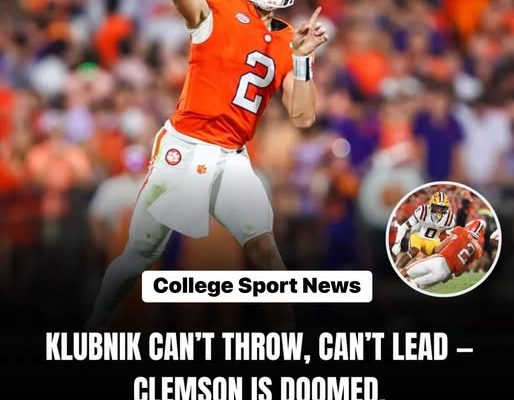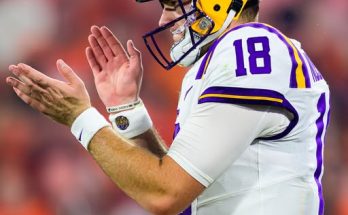The conversation around Clemson quarterback Cade Klubnik has reached a boiling point, and after the team’s high-profile loss to LSU, it’s becoming clear that patience is running thin both inside and outside the program. A quarterback position is often the heartbeat of a team, the spot where leadership, execution, and composure must blend seamlessly to create stability. But in Clemson’s case, the narrative has shifted drastically toward frustration, blame, and calls for drastic changes. Klubnik’s recent performance against LSU is the latest chapter in what has been a polarizing career to this point, and it has fueled one simple but harsh sentiment from critics: it’s time to make a change before this entire season spirals out of control. The emotional wave among fans, media voices, and even some alumni leans heavily toward disappointment, and as always in college football, disappointment breeds demand for action.
Against LSU, Cade Klubnik finished with 230 passing yards on 19-of-38 completions, a stat line that on the surface doesn’t look catastrophic. But statistics often fail to tell the full story. The game-changing moment was his costly interception in the second half, a mistake that tilted momentum in favor of LSU and left Clemson scrambling for answers. Insider Bruce, among others, didn’t hold back in his assessment, labeling the turnover not just as an error but as a symbol of Clemson’s larger quarterback problem. This wasn’t just a bad throw—it was a lapse in judgment, one that carried heavy consequences. In the unforgiving world of college football, where each week can define a season, moments like this are magnified. It’s not simply about losing a game; it’s about what those losses mean for a program trying to reclaim its place among the nation’s elite.
The challenge with evaluating Klubnik is that he’s not devoid of talent. He has the arm strength, flashes of accuracy, and athleticism to give hope. But inconsistency is what haunts him. For every solid completion or clever read, there seems to be an equal number of misfires, slow progressions, or outright mistakes that derail drives. Clemson fans are used to quarterbacks who can elevate the team in big moments. From Deshaun Watson to Trevor Lawrence, the program has thrived when its quarterback was a difference-maker rather than a liability. Fair or not, Klubnik lives in the shadow of those legacies, and each mistake amplifies the perception that he’s not built to meet that same standard. When you’re following in the footsteps of legends, the margin for error shrinks to nearly nothing.
Insiders have warned for months that Clemson’s offensive system can’t afford to operate with a quarterback who wavers under pressure. The Tigers don’t have the overwhelming skill talent across the board that they once did, meaning the quarterback’s role becomes even more central to carrying the offense. Against LSU, the Tigers needed Klubnik to be sharp, decisive, and composed. Instead, his struggles highlighted everything that critics have feared: hesitation in the pocket, questionable decision-making, and a lack of the killer instinct needed to put opponents away. That’s why the interception resonated so deeply. It wasn’t just a turnover; it was the defining play of the game, the moment that crystallized Clemson’s vulnerability at the most important position.
The debate over whether to stick with Klubnik or make a change is more than just a conversation about statistics—it’s about the trajectory of the season. Clemson’s schedule doesn’t leave much room for experimentation. The ACC is more competitive now than in recent years, and non-conference matchups like LSU serve as reminders that every game is a measuring stick for whether this program can return to championship form. If Klubnik continues to struggle, Clemson risks being out of contention long before November. That’s why Insider Bruce’s harsh commentary has resonated with fans who share the same anxiety. “Stay two steps away from this QB,” he warned, and in doing so, he voiced what many fans feel: you can’t trust this quarterback to deliver when it matters most.
Of course, some might argue that pulling the plug on Klubnik too early could do more harm than good. Quarterbacks need time to develop, to learn from mistakes, and to build confidence. Throwing in a backup doesn’t guarantee success—it could simply shift the problems elsewhere. Clemson’s coaching staff faces the difficult balance of deciding whether to ride out Klubnik’s struggles in the hope that he stabilizes, or whether to act decisively in search of a spark. The risk, however, is that by the time a decision is made, the season could already be slipping away. That’s why the urgency from critics isn’t just emotional—it’s practical. If the Tigers wait too long to make a change, they might find themselves locked out of playoff conversations before October.
The frustration also ties into broader questions about Clemson’s offensive identity. For years, the Tigers thrived on creativity, balance, and explosive playmaking. Lately, though, the offense feels stagnant, predictable, and weighed down by mistakes. When a quarterback can’t consistently execute, it limits the play-calling and forces the entire offense into survival mode. That’s not a winning formula against elite teams like LSU. Fans who once celebrated bold, aggressive offensive attacks are now left watching drives sputter and collapse. Klubnik may not be solely responsible for that, but as the quarterback, he’s undeniably at the center of the problem.
It’s also worth considering how leadership plays into this discussion. Quarterbacks aren’t just measured by their stats—they’re judged by how they command the huddle, inspire their teammates, and respond to adversity. That’s another area where critics argue Klubnik falls short. The body language after mistakes, the apparent lack of confidence in key moments, and the inability to rally the offense after setbacks have all been points of concern. For a program like Clemson, leadership at quarterback is non-negotiable. When that leadership feels absent, the call for change becomes even louder.
For fans, this situation is deeply personal. Clemson has built its reputation as a modern powerhouse, and with that comes high expectations. Settling for mediocrity, especially at quarterback, feels unacceptable to a fan base that has grown accustomed to competing for national championships. That’s why the narrative has shifted from mild concern to outright demands: fire Klubnik now or regret it all season. It’s a stark ultimatum, but it reflects the urgency fans feel about salvaging the year. Each game is precious, and the thought of wasting an entire season on a quarterback who doesn’t seem ready is maddening to those who live and breathe Clemson football.
The conversation moving forward will be fascinating to watch. Will Clemson’s coaching staff double down on Klubnik, hoping he can grow into the role, or will they take the bold step of making a change sooner rather than later? Either choice comes with consequences, and either choice will shape the trajectory of the season. But one thing is clear: patience has worn thin, and every snap from this point on will be scrutinized under a microscope.
As you read this, it’s worth asking yourself: do you think Cade Klubnik deserves more time to prove himself, or has he shown enough inconsistency to justify a change? Do you agree with Insider Bruce’s harsh assessment, or do you believe critics are overreacting to a single mistake? College football thrives on these debates, and Clemson’s quarterback dilemma is the latest example of how quickly narratives can shift in this sport.
This is where you come in. The conversation doesn’t end here—it continues with you. Do you think Clemson should stay loyal to their quarterback, trusting that he’ll eventually find his rhythm, or is it time to hit reset and hand the keys to someone else? Your perspective as a fan, a follower of the game, or simply someone who sees the bigger picture is valuable. Share your thoughts, your frustrations, and your hopes for this team. Should Clemson fire Klubnik now or ride it out, hoping for a breakthrough? Drop your opinion, debate it out, and let’s see where the Clemson community stands. After all, this is bigger than just one interception—it’s about the direction of a program that refuses to settle for anything less than greatness.



